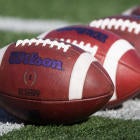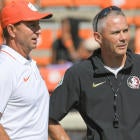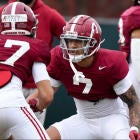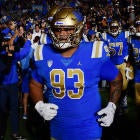When Matt Campbell was a hot coach on the job market last fall, he made it clear to suitors he wouldn’t interview for a job until after Toledo’s MAC Championship Game fate was known. Iowa State felt it needed a strategy to pursue Campbell, so athletic director Jamie Pollard turned to a familiar face: Parker Executive Search, the king of college sports searches.
For about a decade, Parker has helped hire numerous Iowa State employees, including the school’s president, vice president, provost, multiple football and basketball coaches and Pollard himself. In the hunt for Campbell, Iowa State entered into a contract that paid Parker a flat fee of $90,000 plus $7,553 in additional expenses.
Pollard said Parker created a strategy that worked perfectly. Pollard camped out two blocks from Campbell’s house. Once Toledo lost a game that sealed no MAC Championship Game bid, Iowa State was the first to speak with Campbell.
“Nobody was going to be there before us, and (Campbell’s) agent knew and Parker was able to handle that,” Pollard said. “Could we have gotten Matt Campbell without Parker? Probably. But what you have to assess is, what was the marketplace at that time? There were a lot of openings and Iowa State wasn’t perceived as the best of the openings, so you have to have a comprehensive plan.”
Although he appreciates Parker’s work, even Pollard says the method through which coaches get hired is “wrong” and “crazy.” It’s a fast-paced game of chicken, one where confidentiality, acquiring the best information and striking at the right time based on your place in the market has spawned an industry of search firms for coaching hires that continues to grow.
Universities spent more than $750,000 on search firms for the purpose of hiring new football coaches this offseason, according to a CBS Sports analysis of contracts used with outside consultants.
Based on the 11 schools that provided documents, the average cost per search firm was about $70,000. Some public and private schools did not provide their information.
Parker charged the two costliest searches on record: $120,000 in UCF’s hunt that yielded Scott Frost, and the $97,553 in Iowa State’s search. Those numbers pale in comparison to some outrageous figures of the past. Texas spent $267,000 in its 2013 search by Korn Ferry to hire Charlie Strong, and Colorado State spent $250,000 on Spencer Stuart to help hire Jim McElwain in 2011.
Still, the coaching search industry continues to play a major role in who coaches where. At the same time, it raises questions about conflicts of interest and whether the money being spent actually helps more often than not. Athletic directors are willing to take those chances given what's at stake.
“Think about it: You’re offering 15-, 20-, 30-million-dollar contracts on one or two hours of meeting with somebody,” Pollard said. “It’s wrong. It’s crazy. Nobody conducts business that way except college athletics, so you’re forced into (having a search firm) because if the candidate isn’t interested, you can’t have that out there.
“I’ve said this for years: Our business when it comes to how we go about this is so broken, but it is what it is. You’re either going to do it or you’re not. It doesn’t matter what I think about the process because it’s not changing.”
Why Georgia, South Carolina used search firms
Ten years ago, Alabama made one of the most significant coaching hires ever by landing Nick Saban. It was a torturous stop-and-start process that, for a while, looked like it wouldn’t involve Saban coming to Tuscaloosa as he finished out his season with the Miami Dolphins.
Alabama spent $35,000 on prominent headhunter Chuck Neinas, who was involved in the Crimson Tide's failed talks with Rich Rodriguez but played no role in hiring Saban. In 2016 dollars, that’s $41,165 for Neinas to help Alabama, which is as high-profile a job as there is in football.
This year, Maryland paid Neinas $51,588 in its search that resulted in the hiring of Michigan defensive coordinator D.J. Durkin. At least seven schools spent more than what Neinas received on the Maryland job.
“I don’t understand how some of the people charge what they do,” Neinas said. “I’m a bargain. I think I may be the most economical, but my situation is different. I’m not in it as a business. I’m more in retirement mode than anything else.”
Out of the 28 schools with a job opening after the 2015 season, 16 reported using a search firm. Those 16 used a total of eight firms with Parker Executive Search and Eastman & Beaudine Inc. receiving the most work (three schools each). Athletic directors who use search firms say they’re not outsourcing their work but rather being smart to get extra help during a sensitive period. Plausible deniability about who got contacted for a job is a friend to athletic directors.
| Schools that hired firms in 2016 | |||||
| School | Coach | Search firm | Total cost | Contract cost | Additional expenses |
| UCF | Scott Frost | Parker Executive Search | $120,000 | $120,000 | Did not provide |
| Iowa State | Matt Campbell | Parker Executive Search | $97,553 | $90,000 | $7,553 |
| Missouri | Barry Odom | College Sports Solutions | $84,721 | $75,000 | $9,721 |
| South Carolina | Will Muschamp | Eastman & Beaudine, Inc. | $80,000 | $75,000 | $5,000 |
| Rutgers | Chris Ash | Eastman & Beaudine, Inc. | $80,000 | $75,000 | $5,000 |
| Memphis | Mike Norvell | Eastman & Beaudine, Inc. | $75,000 | $70,000 | $5,000 |
| Texas State | Everett Withers | Parker Executive Search | $61,130 | $60,000 | $1,130 |
| Maryland | D.J. Durkin | Neinas Sports Services | $51,588 | $50,000 | $1,588 |
| UTSA | Frank Wilson | Collegiate Sports Associates | $50,000 | $50,000 | -- |
| Georgia | Kirby Smart | Carr Sports Consulting | $42,175 | $40,000 | $2,175 |
| Louisiana-Monroe | Matt Viator | College Sports Solutions | $25,000 | $25,000 | -- |
| Miami | Mark Richt | Korn Ferry | Did not provide | -- | -- |
| Tulane | Willie Fritz | College Sports Solutions | Did not provide | -- | -- |
| Toledo | Jason Candle | DHR International | $27,000 * | N/A | N/A |
| North Texas | Seth Littrell | DHR International | Did not provide* | -- | -- |
| Virginia | Bronco Mendenhall | Neinas Sports Services | Did not provide^ | -- | -- |
|
* North Texas declined to provide financial numbers, citing state confidentiality laws. Toledo declined to specify how much of the costs by its search firm were professional fees compared to administrative fees. |
|||||
At Georgia, after Mark Richt was fired, there was little doubt who the Bulldogs had pegged at No. 1: Alabama defensive coordinator Kirby Smart. Georgia paid $42,175 to CarrSports Consulting for Bill Carr’s help in the search.
Carr didn’t act as an intermediary for Georgia and didn’t contact anyone connected with Smart, Georgia athletic director Greg McGarity said. Instead, McGarity said Carr helped by talking with him on the phone and meeting in Atlanta for multiple days to discuss every facet of the search.
“You talk about strengths and weaknesses of a number of candidates,” McGarity said. “You look at things as simple as YouTube videos. How does an individual handle a tough situation? Are they able to be an effective communicator? Some candidates have a lot more available online than others. With the ability to search and take the time necessary to do that, you have so many more tools at your disposal that can help elevate candidates or dismiss candidates.”
McGarity said Carr helped in case Georgia had “blind spots” when discussing candidates. He also helped prepare the Bulldogs for the transition of a new staff.
“In some ways, we had been operating for 15 years in one way,” McGarity said. “So having someone assist in that transition period on what we should expect and how we should approach certain things administratively was extremely beneficial to us as a staff.”
South Carolina athletic director Ray Tanner had never conducted a football coaching search when Steve Spurrier resigned midseason. Tanner said he began vetting search firms more than a year ago because he knew Spurrier would resign sooner rather than later and wanted to be prepared.
“I didn’t call up search firms and say, ‘I may need a search firm and start asking questions,’” Tanner said. “I kind of vetted them out through other people and asked questions.”
Yes, in the coaching search industry, even search firms get vetted confidentially.
Tanner ended up with Eastman and Beaudine, which charged South Carolina $80,000 for a 54-day search -- ancient in most college football searches -- that yielded Will Muschamp. Tanner said he liked that the firm’s CEO, Bob Beaudine, customized the search for South Carolina’s needs rather than use a cookie-cutter approach.
“He’s a very bright man. He’s written a couple books now,” Tanner said. “I looked at him kind of like a coach in this search. I’d make a statement, and he’d ask me a question. Our conversations in many cases were long and often, and I felt like he helped me get to a point where I was very comfortable in what I was looking for and the questions I needed to ask.”
Relatively speaking, $80,000 for a search firm is a drop in the bucket for a school like South Carolina. Still, the question remains: If the most important job for an athletic director is to hire the right coach, why does the athletic director need to spend money for outside help in a process that ADs once handled on their own?
“I would say I need every moment and I wanted to exhaust every possible resource to feel extremely good about the decision at the end,” Tanner said. “They can do more in a short period of time and you can literally be on it around the clock. I think it’s probably virtually impossible for an AD to be on it around the clock. I know the landscape has changed. If I went through this again, would I hire a search firm? Very likely. There’s so much information out there and everything is time sensitive and confidential.”
Yet even a search firm couldn’t prevent some embarrassment for Tanner. Shortly before Muschamp was hired, Arizona athletic director Greg Byrne tweeted that his coach, Rodriguez, did not accept an “offer” from South Carolina. Tanner said Byrne’s tweet was “inaccurate.”
McGarity said the first time he interacted with Smart was in Atlanta after Alabama won the SEC Championship Game.
“That’s important for me,” McGarity said. “That may be part of our profession that has maybe lost its way to some level. In speaking with a couple other ADs during the process, who will go nameless, as far as the way you run a search, they were surprised and disappointed the interaction with their fellow ADs was not in place. Either there had been some interaction or a third-party did some background work in that area.”
Many athletic directors crave search firms for confidentiality and plausible deniability about candidates they’re vetting.
“What’s changed? Agents,” explained Pollard, Iowa State’s AD. “You can’t trust anybody. As soon as I make a call to an agent, that agent is putting it on Twitter or giving it to some reporter. Who’s sincere? Who’s trying to get a raise for their client? Who’s going to make me look bad in the process because they’re not interested? When you’re on this side and know exactly what happened and you see all the rumors, it’s mind-boggling the amount of misinformation out there. The crux of it is the agents because the agents get paid for more money for their clients.”
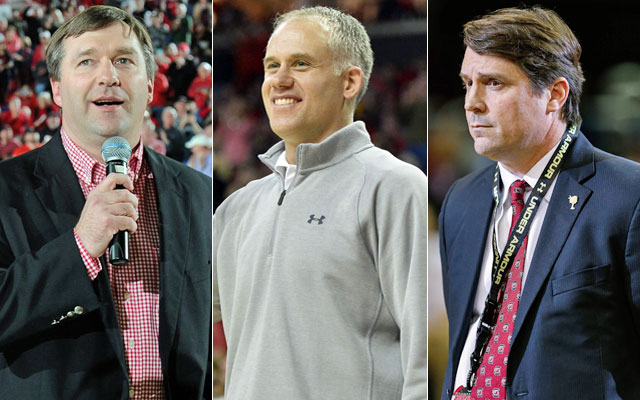
Criticism of search firms
An important truth of the search firm industry: There’s a lot more money in college sports. That means there’s a lot more money available to spend on services such as search firms, and there’s a lot more money at stake if the wrong person is hired to lead a team.
Pollard traces a major part of the search firm boon in college sports to 2002, when the NCAA used a search firm to hire president Myles Brand. “When he got hired by the NCAA through a search firm, I think we started seeing that process more often,” Pollard said.
Parker Executive Search was used by the NCAA to hire Brand and then again to hire Brand’s replacement, Mark Emmert. Parker has helped to fill 12 NCAA executive positions in recent years, USA Today reported in 2013.
For coaching candidates in college sports these days, it’s often not only who you know among ADs, but who you know leading the search firm. Eyebrows were raised recently when Pittsburgh hired Vanderbilt basketball coach Kevin Stallings. Pitt used the search firm Collegiate Sports Associates, whose founder, Todd Turner, once hired Stallings at Vanderbilt as the school’s athletic director.
For years, some search firms have faced criticism of pushing certain candidates for jobs because of past relationships and regardless of fit for a position. Also, background checks haven’t always caught embarrassing information about a hire that comes out later.
Parker Executive Search faced recent criticism for assisting Iowa’s recent presidential search and not finding that the next president, businessman Bruce Harreld, inaccurately listed his current employment on his resume. There have been other complaints against Parker.
Minnesota President Eric Kaler faulted Parker for not uncovering a past sexual harassment complaint against athletic director Norwood Teague, who was fired by Minnesota last year over new sexual harassment allegations. In 2013, Rutgers hired athletic director Julie Hermann, who has since been fired, without Parker uncovering accusations of verbal and emotional abuse from former volleyball players against Hermann.
During the recent football coaching carousel, Parker charged the most amount of money among schools that provided documents to CBS Sports. Parker Executive Search chairman Dan Parker did not respond to requests for comment.
Texas State, for instance, spent about $36,000 more on Parker for its search than fellow Sun Belt school Louisiana-Monroe spent on College Sports Solutions. Texas State has a five-year contract with Parker through 2016 for use “as needed” and on a “non-exclusive” basis, according to the terms. Price adjustments are allowed during the course of the deal if mutually agreed upon by both parties.
Among the stated duties for Parker’s searches with Texas State: advise and facilitate the process, prepare the school for interviews, schedule all interviews for candidates, and conduct background checks on candidates. In addition to a flat fee, Parker’s contract with Texas State said it would hold reimbursable expenses (long distance calls, research, delivery services) to no more than 12 percent of the fee. Texas State’s additional expenses for this search was 2 percent of the $60,000 fee.
If new Texas State coach Everett Withers leaves “for any reason” during his first year on the job, the contract states Parker would conduct another search without a fee and be paid for out-of-pocket expenses. The University of Texas-San Antonio has a similar clause in its contract with Collegiate Sports Associates, though the free flat fee would only kick in if new coach Frank Wilson leaves on his own within one year.
Repeat business can be a boon for search firms. Given how frequently coaches and ADs get hired and fired these days, opportunities aren’t lacking for search firms.
At UCF, the school paid Parker $120,000 for its athletic director search last fall that resulted in the hiring of Danny White. UCF then paid Parker another $120,000 for its football coaching search this offseason. This spring, UCF found itself in a men’s basketball coaching search. White did not respond to requests for comment. UCF did not respond to a question about whether Parker handled the men's basketball coaching search and, if so, at what cost.
At Iowa State, Pollard was hired as athletic director in 2002 through work done by Parker. Pollard regularly uses Parker for coaching searches.
“I’m going to use somebody I feel understands our institution and our president and me personally,” Pollard said. “Their familiarity with us is more important than the fact they did a search for Iowa State to hire me 11 years ago. It’s kind of immaterial at this point. They’ve got a long relationship in the state of Iowa.”
Not everyone uses search firms
Still, 12 universities reported not using search firms for their football hires this offseason: USC, Georgia Southern, Hawaii, Minnesota, Syracuse, Virginia Tech, Bowling Green, BYU, East Carolina, Illinois, Ball State and Southern Miss. In some of those instances, the hires were promotions from within the staff and a wide net wasn’t really cast for a replacement.
| Schools that did not hire a firm | |
| School | New coach |
| USC | Clay Helton |
| Georgia Southern | Tyson Summers |
| Hawaii | Nick Rolovich |
| Minnesota | Tracy Claeys |
| Syracuse | Dino Barbers |
| Virginia Tech | Justin Fuente |
| Bowling Green | Mike Jinks |
| BYU | Kalani Sitake |
| East Carolina | Scottie Montgomery |
| Illinois | Bill Cubit, Lovie Smith |
| Ball State | Mike Neu |
| Southern Miss | Jay Hopson |
Virginia Tech wasn’t one of those. Hokies’ athletic director Whit Babcock needed to find a replacement for legendary coach Frank Beamer. He hired Memphis’ Justin Fuente -- considered an attractive young coach -- without using a search firm. Time will tell if the hire works out. Babcock got praised for landing Fuente and previously surprised many people by being able to attract Buzz Williams from Marquette to coach basketball.
Babcock declined to be interviewed for this article. In December, The Washington Post reported that Babcock used a small search committee of administrators and learned from mutual connections that Fuente thought Virginia Tech was an ideal destination.
“You can have a wish list of coaches, but something that I’ve tried to learn is that the wish list pretty quick better turn into a list of coaches who are going to say yes to your job,” Babcock told The Post. “Fortunately in this case, the guy who was No. 1 on our wish list was also a guy who was interested in our job. It worked out wonderfully.”
In some cases, getting transparency about coaching search firms proved to be difficult. Three public universities declined to release their financial data for the searches to CBS Sports.
Virginia said that if such records exist for the search to hire Bronco Mendenhall from BYU, they belong to the privately-funded Virginia Athletics Foundation. Virginia senior associate athletic director Dirk Kastra, the foundation’s executive director, declined to provide a copy of the search firm contract.
Neinas, the former Big 12 interim commissioner, said his consulting firm, Neinas Sports Services, handled Virginia’s search. Mendenhall’s decision to leave BYU for Virginia was one of the most surprising in the offseason because it stayed so quiet.
“There has to be trust between the coach and the institutional representative,” Neinas said. “(Mendenhall) did an outstanding job in his presentation. He was on Virginia’s list from the beginning.”
Toledo and North Texas declined to provide financial details from their search-firm contracts with DHR International. The contracts for DHR International are marked “confidential,” and both Toledo and North Texas interpreted that to mean the terms can’t be disclosed despite use of public money for the services.
North Texas hired Seth Littrell, who had been assistant head coach of offense at North Carolina. North Texas has asked the Texas attorney general’s office for a ruling on whether the entire DHR International contract must be released.
There is precedent in Texas for third-party contracts with public universities to be open. In 2015, a talent booking agency opposed a records request by the Houston Chronicle to learn how much money the University of Houston spent on Matthew McConaughey as its commencement speaker. The state attorney general ruled in favor of the Chronicle and the fee was revealed.
Toledo promoted offensive coordinator Jason Candle as its head coach to replace Campbell. Toledo cited the Ohio Public Records Act as the reason certain “trade secret” information was redacted in its DHR International contract.
The Ohio Sunshine Laws manual states that a public entity “bears the burden” to demonstrate why the protected information can remain redacted regarding how public money is spent. A Toledo spokeswoman said in February an attorney would review the matter further and follow up as soon as possible. Toledo did not respond to a follow-up request this month.
(Update: On April 13, Toledo associate general counsel Natalie Jackson said she has provided DHR International with a notice of intent to release the contract. DHR International has 10 days to seek an order prohibiting the release. On April 25, Toledo unredacted a portion of its invoice that showed the university paid $27,000 to DHR International for the coaching search.)
The fact athletic departments are using DHR International to help hire football coaches speaks to how the industry has changed in recent years. DHR International does global executive searches across Asia, Europe, North America and South America in 19 different fields, including sports.
“When I started, it basically was people would call and say, ‘Can you give me a hand?’” Neinas said. “It was basically more of a personal service, and it was very simple. Now some of the larger firms have gotten involved and athletics are a sidebar for their overall work. Now the institutions put out requests for proposal. It’s a lot more involved.”
So is the chase for college football coaches: a world filled with rumors, long processes and quick strikes. It pays to search.
Follow and read more from Jon Solomon on Facebook and Twitter.












